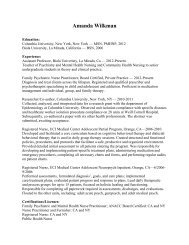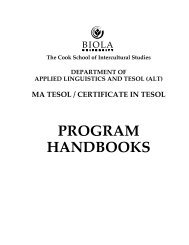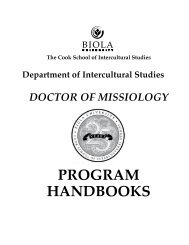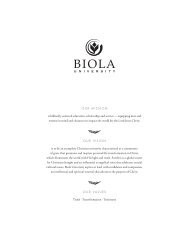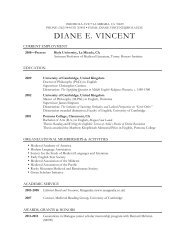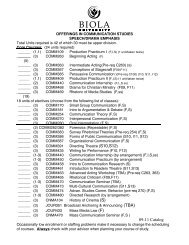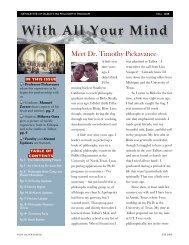Dawkins' God Delusion Divorced American ... - Biola University
Dawkins' God Delusion Divorced American ... - Biola University
Dawkins' God Delusion Divorced American ... - Biola University
Create successful ePaper yourself
Turn your PDF publications into a flip-book with our unique Google optimized e-Paper software.
BIOLA CONNECTIONS ❁ SPRING ’07 ASK AN EXPERT 07<br />
What Should Christians<br />
Know About The <strong>God</strong> <strong>Delusion</strong>?<br />
In The <strong>God</strong> <strong>Delusion</strong> (Houghton Mifflin, 2006),<br />
O<br />
Oxford biologist Richard Dawkins argues that<br />
belief in <strong>God</strong> is delusional and deadly. The book<br />
reached No. 2 on the Amazon.com best sellers list<br />
in November. It ridicules <strong>Biola</strong> <strong>University</strong> in a footnote<br />
on page 84 that notes former atheist Antony<br />
Flew’s acceptance of <strong>Biola</strong>’s “Phillip E. Johnson<br />
Award for Liberty and Truth.” <strong>Biola</strong> Connections<br />
asked Dr. Douglas Geivett — a <strong>Biola</strong> philosophy<br />
professor — to comment on the book.<br />
What’s Dawkins’ take on religion?<br />
Dawkins believes religion promotes immorality<br />
and threatens human survival — including hindering<br />
science, fostering homophobia and kindling<br />
fanaticism. The final chapters read like a<br />
manifesto for the eradication of a disease. The<br />
book is filled with scornful remarks against religion,<br />
like: “The <strong>God</strong> of the Old Testament is<br />
arguably the most unpleasant character in all fiction:<br />
jealous and proud of it; a petty, unjust,<br />
unforgiving control freak; a vindictive, bloodthirsty<br />
ethnic-cleanser; a misogynistic, homophobic,<br />
racist, infanticidal, genocidical, filicidal,<br />
pestilential, megalomaniacal, sadomasochistic,<br />
capriciously malevolent bully” (page 31).<br />
How have people been “deluded”<br />
by religion, according to Dawkins?<br />
Dawkins claims that religious beliefs emerged<br />
through the evolutionary process, serving certain<br />
survival goals. Now, however, they have outlived<br />
their usefulness. He believes the brain constructs<br />
sensory experiences that people mistake as <strong>God</strong>.<br />
How does Dawkins respond to the<br />
traditional arguments for <strong>God</strong>’s existence?<br />
Dawkins responds with glib comebacks and<br />
simplistic arguments. He objects to cosmological<br />
arguments, suggesting that if <strong>God</strong> is required to<br />
explain the existence of the universe, then<br />
something else is required to explain the existence<br />
of <strong>God</strong>. But this is a mistake since <strong>God</strong> is selfsubsistent,<br />
whereas the universe is not. Dawkins<br />
calls the ontological argument “infantile.” But he<br />
hasn’t shown that the existence of <strong>God</strong> is<br />
impossible, and he doesn’t seem to understand<br />
that, according to contemporary versions of the<br />
ontological argument, if the existence of <strong>God</strong> is<br />
possible, then it’s also necessary.<br />
What does he do with the currently<br />
popular “Intelligent Design” arguments?<br />
Dawkins says the appearance of design in the<br />
universe is an illusion that can be explained by<br />
evolution, with one important qualification. At<br />
least three crucial gaps in the progress of<br />
evolution — between non-life and first life,<br />
between cell bacteria and organisms containing<br />
the all-important eukaryotic cell, and between<br />
non-conscious life and first consciousness — all<br />
apparently must be bridged by sheer luck!<br />
Dawkins also claims that the designer hypothesis<br />
“raises an even bigger problem than it solves:<br />
who designed the designer”? (page 121; italics<br />
added). If the existence of a universe with the<br />
appearance of design is statistically improbable,<br />
he says, then any Being who could qualify as the<br />
designer must be much more improbable. But<br />
his argument doesn’t even come close to proving<br />
that <strong>God</strong> does not exist. The existence of our<br />
universe, with all of its apparent design, is<br />
“statistically improbable” precisely because it<br />
could have not existed (and, indeed, has not<br />
always existed). But if <strong>God</strong> is the designer who<br />
created the universe, and He has always existed<br />
and could not have not existed, then there’s<br />
nothing statistically improbable about His<br />
existence; the Designer doesn’t need a designer.<br />
What’s the most serious flaw in the book?<br />
Dawkins is a scientist, not a philosopher — and it<br />
shows in his reckless forays into philosophy. He<br />
ridicules one argument for the existence of <strong>God</strong><br />
without naming a single individual who actually<br />
endorses that argument — or even stating the<br />
argument clearly. He simply says it’s a “popular<br />
strand of argument” that links “the existence of<br />
great art to the existence of <strong>God</strong>” (pages 86-87).<br />
Dawkins doesn’t understand Pascal’s wager, which<br />
doesn’t seek to convince people of <strong>God</strong>’s existence,<br />
but simply invites reasonable agnostics to<br />
“bet on <strong>God</strong>” by living their lives as if <strong>God</strong> exists.<br />
And Dawkins miscasts C. S. Lewis’s “Liar, Lord or<br />
Lunatic” trilemma as an argument from Scripture<br />
for <strong>God</strong>’s existence. Lewis’s famous argument<br />
doesn’t come from Scripture, and it doesn’t seek<br />
to prove <strong>God</strong>’s existence. It’s an argument for the<br />
deity of Jesus Christ — an argument that presupposes<br />
reasonable belief in <strong>God</strong>.<br />
R. Douglas Geivett, Ph.D.,<br />
teaches in <strong>Biola</strong>’s seminary, Talbot<br />
School of Theology. He is the author of<br />
Evil and the Evidence for <strong>God</strong> (Temple<br />
<strong>University</strong> Press).



